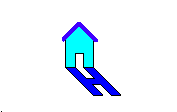The Hospital at Home Service (HAH) has been active since 1985 at the Complex University Structure of Geriatrics at Molinette Hospital, Azienda Ospedaliero-Universitaria Città della Salute e della Scienza di Torino.
Patients followed by the Hospital at Home Service mainly come from the Emergency Department and the Medicine and Surgery departments of the Hospital. They present pathologies similar to those found in various inpatient departments, including acute heart failure, infections requiring intravenous antibiotic therapy, acute or chronic neurological diseases in advanced or terminal stages, decompensated liver cirrhosis, dehydration, tumors, and hematological pathologies with a high need for transfusions.
The objectives are:
- Ensure at the home level, for adults and the elderly, including those who are not self-sufficient, healthcare, even complex, similar to that provided in the hospital.
- Improve personalized care for the patients.
- Implement an early reintegration of the person into their social and family environment after hospitalization.
- Implement appropriate methodologies for integrated and unified healthcare through the multidisciplinary team.
REQUIREMENTS FOR ACTIVATION
- Informed consent of the patient and family.
- Residence in the service area.
- Residence in the Piedmont region.
The Geriatric Home Hospitalization Service (GHHS) is operating in Torino at Città della Salute e della Scienza since 1985.
GHHS provides diagnostic and therapeutic treatments by health care professionals, in the patient’s home, of a condition that otherwise would require acute hospital in-patient care. A quick admission to hospital is possible for examinations or interventions that are not possible to carry out at home.
GHHS normally operates 12 hours a day (from 8.00 am to 8.00 pm), seven day a week. At night our Regional Emergency Unit (“112”) can be contacted. For select patients, medical staff is on-call 24 hours a day. The team is multidisciplinary and consists of geriatricians, nurses, physioterapists, social workers and psychologists. Hospital retain legal and financial responsability for care provision. Patients are considerated hospital inpatients until discharge from GHHS end drugs or technologies are supplied by the hospital.
Since 2001, a close collaboration has been started between GHHS and the Emergency Department (ED) of our Hospital.
Now, about 25% of our patient referred from ED, 25% from hospital wards and 50% from Specialists General Pratictioner in the community. Very important is the relatioship between the ED team and “GHHS mobile team” consisting of a geriatrician and a nurse. By using a multidimensional case sheet, the “GHHS mobile team” carries out an assessment of patient and his caregiver to evaluate the possibility of hospedalization at home and in order to give informations on GHHS. We have made up a “Module of interview with the family” to discover the willingness of the family to work together with GHHS team, as a part of the patient’s health-care system. When the availability is established, an “Informative Card” with information on our service has given to the patient and his caregiver. Then, the “GHHS mobile team” together with the ED doctors writes a rough copy of patient’s case sheet, which will be completed at home during the first GHHS visit. In the ED all the necessary diagnostic tests (blood tests, radiography, ECG …) are provided and then the patient moves home by ambulance. Sometimes, patient return back home within a few hours.
Entry criteria for GHHS are: informed consent of patient and caregiver, stable, diagnosed medical conditions needing hospidalization but not expected to require emergency intervention, appropriate care supervision, telephone connection, living in the hospital catchment area (southern part of the city). Exclusion criteria are: necessity of intensive monitoring or mechanical ventilation, a monitoring more frequent than every 2 hours of blood pressure or haemogasanalysis, patient with an heart attack or with very low levels of oxygen in the blood or with serius acidosis or alkalosis or with hypotension or a suspect of pulmonary embolism.
Many services or treatments can be provided at home: blood tests, medications, electrocardiogram, spirometry, pulseoximetry, oximetry, oxygen and other respiratory therapies, oral and intravenous medications, including antimicrobials and cytotoxic drugs, blood product trasfusion, surgical treatment of pressure sores, looking after central venous tubes, echocardiograms, internistic echographies and doppler ultrasonographies.
Non-pharmaceutical treatments include physical therapy, occupational theraphy, counselling. Until now about 20000 admissions have been recorded. Most important diagnosis on admission were: cardiac failure, cerebrovascular and respiratory disease, infections, cancer.
GHHS is a feasible alternative care to hospital for frail elderly patients. The collaboration between GHHS and ED improve the efficiency and effectiveness of health intervetions for acute elderly patients.
